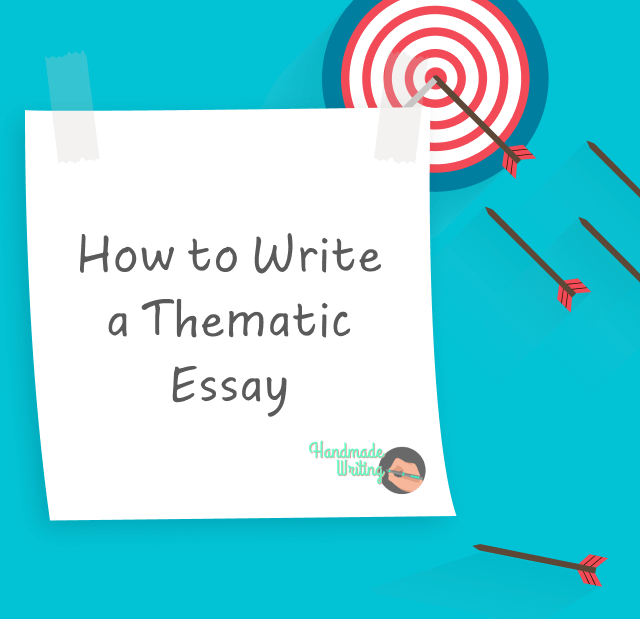
The road to graduation from any educational institution is lined with essays and written assignments – and the majority of these happen to be thematic essays, as they are supposed to demonstrate that the students understand the topic or material well. A thematic essay is almost as old as writing is, for it focuses on investigating a topic to provide detailed analysis and evidence of why a certain claim can be made.

The road to graduation from any educational institution is lined with essays and written assignments – and the majority of these happen to be thematic essays, as they are supposed to demonstrate that the students understand the topic or material well. A thematic essay is almost as old as writing is, for it focuses on investigating a topic to provide detailed analysis and evidence of why a certain claim can be made.

Download file | Recorded on August 6, 2020

Although this type of essay is commonly used to analyze some historical facts or a specific literary piece and its significance, a thematic essay can be assigned on a variety of subjects. It is also a traditional classroom essay that may be a part of different exams, so students may be required to craft a thematic essay within limited time, sticking to the topic provided. This is the main reason why they consider thematic essays difficult, but whenever there’s a longer deadline and a choice of topics, the writing process is easier.
However, there’s an important thing that everyone who’s wondering ‘what is a thematic essay?’ needs to know. This type of essay mainly lets the teacher determine your knowledge of the material, and it should demonstrate your comprehension of the topic that you can back up with solid arguments and relevant examples. But proper structure is just as essential to your writing as the scope of the topic. All of the points you want to make, as well as the supporting evidence must be organized in a clear, consecutive way. If your essay lacks focus or is illogical in its organization, your readers will not be able to recognize neither the thoroughness of your research, nor the significance of your critical thinking. They might even have trouble following what evidence you found to help you arrive at a certain conclusion.
To tackle this type of essay, you often have to narrow down a topic that’s too broad before getting started on your writing. A theme is what an author portrays in a literary work, or the specific point the author is making. Often, it is the most frequently discussed one, or it is a lesson of the greatest overall significance that can be derived from the work and applied to our lives. Thus, to effectively plan out how you are going to write a thematic essay, identify the theme first. Focus on the main point the author is trying to make about a particular subject, the message he is trying to convey, why it is relevant or important at the moment, and the way the reader can benefit from it.
That’s why having a place to start and an outline to follow lays the groundwork for your thematic essay. It is the most important step in the entire essay writing process.
By using an outline to shape your essay, you have a format to follow that ensures knowledge of the topic, addressing all the questions of the assignment, and keeping all of the points you want to make well-organized. A thematic essay outline lets you effectively draw parallels between different facts, formulate a coherent and detailed evaluation of the topic, and see whether something in the essay is lacking or needs to be rearranged and revised.
Some essay types may have less rigid layouts and writing requirements, allowing for more creativity and freedom when it comes to formatting. However, this is not the case with instructions on how to write a thematic essay. Just as with other traditional essays, there should be at least five paragraphs in a thematic essay, including an introduction with a thesis statement, three body paragraphs that will support your thesis with relevant arguments and examples, and a logical conclusion to wrap everything up at the end.
Generally, to write a thematic essay you need to have an idea of what your thesis will be, how your body paragraphs will prove it, and how you are going to summarize all of the arguments detailed in the body of the essay in your conclusion. The introduction has to present the main subject of your essay as well as any necessary background information and your thesis statement. At the same time, it should be interesting enough to make the reader want to learn more about the topic. The opening sentence of the introduction is often referred to as a ‘hook’ because it is supposed to grab the reader’s attention. For this purpose, it can evoke anticipation, controversy, irony, or ask a question. The thesis statement is very important because it gives your topic a direction and a specific purpose.
The thesis statement lays the ground for further analysis, for answering a specific question, asserting an opinion or explaining how and why something works (or has worked/failed to produce an expected result). Think of your thesis statement as a compelling and concise headline that gives the reader a good idea of what the rest of the paper is about and what to expect next. It should be engaging, but not confusing to your audience. Have you ever been extremely disappointed by reading an article or watching a movie because it wasn’t what the headline, magazine cover or a movie trailer promised it to be? To make sure your reader doesn’t feel like that, you want your thesis to be integral to the essay and to all of the evidence that you provide in the following body paragraphs. Quite often, a thesis statement needs a few revisions to acquire more focus and clarity as you add the body paragraphs to your thematic essay.
While the 5-paragraph structure gives you a basic layout to work with, it should have three body paragraphs because the thesis must be supported by at least three significant arguments. However, unless the essay has a required length, you can include more supporting facts or examples. There may be more body paragraphs than just three, depending on the details of the assignment or the points you are required to address, but keep in mind that your essay should be concise and devoid of wordiness. Usually, the essay writer should focus on one point or sub-topic per paragraph, but depending on the complexity of the topic, the quantity of paragraphs for validating each claim or explaining your reasoning may vary.
You can think of body paragraphs as building blocks that include expert quotes or specific examples to add weight to them, as well as to your arguments. This is the ‘meat of your essay’ as long as you make sure that you explain the logic behind each quotation or evidence supporting your claim, and that it is in sync with your thesis statement. Such connections are essential as they tie not only the evidence and arguments, but an entire essay together.
The conclusion is not simply a reiterated thesis, but a reinforced one. However, it’s important to keep in mind that it should not introduce any new facts not discussed in the body of a thematic essay. The conclusion has to summarize the information presented in the essay, briefly going over the main ideas or claims and explaining how they influence your thesis. Finally, it should wrap up your essay in the most meaningful way, emphasizing the significance and relevance of your topic.

Check the examples of thematic essays to use as writing models:
To sum up, reading some properly structured thematic essay examples may be the most helpful tip for understanding what your essay should look like, and how to organize your thoughts into a logical sequence. Besides, a list of the most commonly used thematic essay topics is a frequent search query along with ‘thematic essay examples’, as it helps students to get an idea of what to expect at exams.
In this essay, there will be fewer words that address the reader. The purpose of this writing is to present a balanced analysis of a topic based on facts, explaining a topic in a logical and straightforward manner.
US History thematic essay example topics:
These topics are likely to feature broad concepts, but they usually include tasks and suggestions that are more specific. In your essay, you are supposed to address this detailed task and the issues, concepts or questions it prompts you to explain or interpret. Using examples from your course of global history or geography is also required in your thematic essay.
Global Regents thematic essay example topics:
A belief system is a way a group or an individual regards religious or philosophical principles. The beliefs that have formed major religions or a mainstay of a civilization may be similar or different, but each belief system has influenced the lives of its followers as well as the history, culture, politics, or economy of a specific nation or country.
Belief Systems thematic essay example topics:
While students often have difficulties writing thematic essays, these are not the most complicated tasks to complete within a certain course or subject. They just require making a detailed examination of the topic using relevant facts, examples or other evidence that you should be able to find in order to make your arguments more solid, and to show that you have gained a thorough understanding of the topic. However, you mustn’t just summarize the well-known facts or what you have learned from a course or book. In a thematic essay, you are supposed to identify and explain or compare issues, causes, patterns, outcomes, and connections between facts or events as well as their consequences or influences.